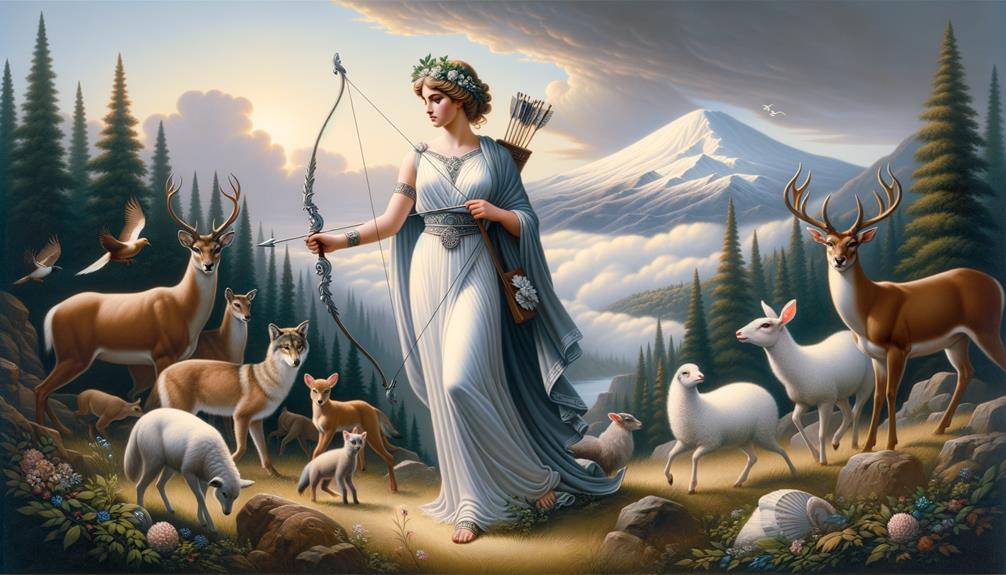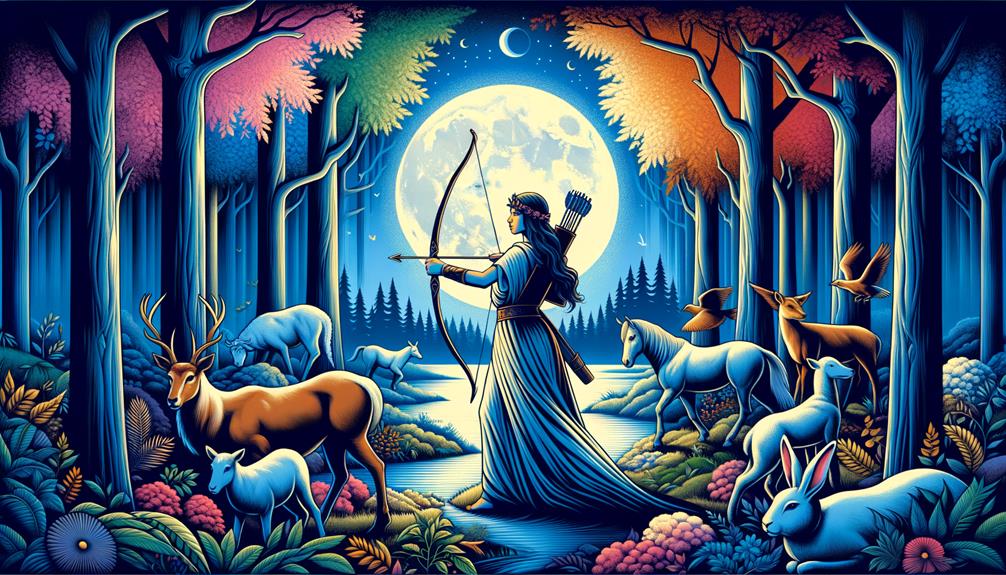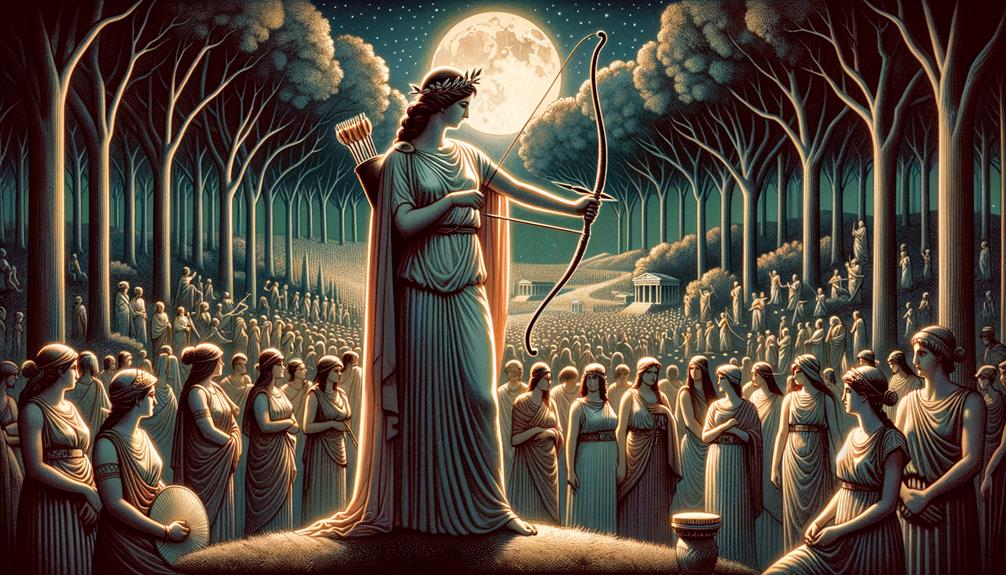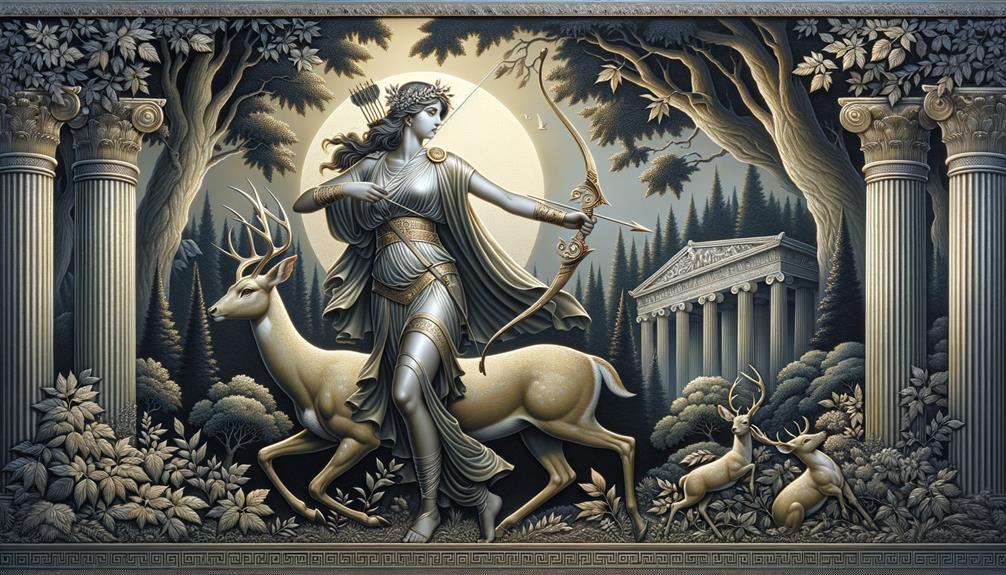Unveiling Artemis: The Vibrant Paradox of the Greek Huntress Goddess
In the vast cosmos of ancient Greek mythology, Artemis, the virgin huntress, stands apart. With over 200 epithets to her name, she is a figure of immense complexity and intrigue. Isn't it fascinating that a single goddess can personify such a wide spectrum of traits? Artemis, both the protector and the destroyer, mirrors the dual nature of existence. She's a valiant warrior and a nurturing nurse, a defender of the vulnerable and a ferocious beast. How can one entity personify such contrasting aspects, you wonder? Let's delve deeper into the enigmatic world of Artemis to understand the ancient Greeks' perception of their surroundings.
Artemis: The Paradoxical Goddess
Artemis is a paradox, a fusion of the wild, untamed wilderness with the nurturing, protective aura of childbirth and infancy. Her character reflects the ancient Greeks' understanding of their world, a sphere where life and death, creation and destruction coexist. Observing Artemis, we gain a deeper understanding of Greek culture and its nuanced view of existence.
The Dual Nature of Artemis
Artemis epitomizes the dual nature of existence. As a fierce warrior, she safeguards the vulnerable, symbolizing courage and resilience. As a tender nurse, she nurtures new life, highlighting the softer, caring facets of her persona. Her fascinating character presents a unique lens through which to view and understand the world of the ancients.
Understanding Artemis: A Journey into Ancient Greek Culture
To truly comprehend this paradoxical goddess, we must immerse ourselves in the vibrant world of ancient Greece. By exploring Artemis' multifaceted character, we can gain insights into the Greek understanding of the world and life itself.
So, let's embark on this fascinating journey into the complex world of Artemis, the Greek huntress goddess. Together, we'll unpack her intriguing character and explore what it tells us about the vibrant culture and worldview of the ancient Greeks.
Final Thoughts
Artemis, the Greek huntress goddess, is a figure of immense complexity and fascination. As we explore her character, we gain a deeper understanding of the diverse and nuanced world of the ancient Greeks. Her story is a testament to the rich tapestry of ancient Greek culture, a world where contrasting elements coexist in harmony. Come, join us on this journey of discovery and let's unravel the mysteries of Artemis together.
The Origins of Artemis

The Intriguing Background of Artemis
Diving into the captivating lore of ancient Greece, we encounter Artemis, the revered goddess of hunting and wilderness. Her origins, as spellbinding as they are unconfirmed, make for a compelling tale. Born from the divine union of Zeus and Leto, Artemis shares the title of sibling with none other than Apollo, adding a layer of mystique to her persona. The story of her birth on the idyllic island of Delos only enhances this allure.
Artemis: The Wild and Protective Goddess
Artemis, as the goddess of hunting, stands as a powerful emblem of the untamed and the wild. Iconic images often show her equipped with hunting essentials like a bow and arrow, a quiver, and hunting knives. However, Artemis is not just about the pursuit of game. She embodies a protective spirit, specifically towards young children and particularly girls, revealing a nurturing aspect amidst her otherwise fierce demeanor.
The Name Artemis: A Mystery in Itself
The etymology of her name, Artemis, is cloaked in mystery. Theories about her name's origins span from pre-Greek beginnings to potential Persian roots implying 'great', 'excellent', or 'holy'. These interpretations hint at the high esteem in which ancient societies held her, underlining her prominent role in the pantheon of Greek deities.
Through the captivating figure of Artemis, we gain insights into the ancient Greeks' deep respect for the raw forces of nature and the divine. Their awe and trepidation find a common meeting point in this formidable huntress.
Artemis: A Glimpse Into the Ancient Greek Reverence
The story of Artemis provides a vivid glimpse into the ancient Greeks' respect for the wild and the divine. This awe-inspiring huntress, Artemis, symbolizes their mixed feelings of reverence and fear. With this understanding, we can better appreciate the rich tapestry of mythology that has shaped our understanding of ancient Greek culture.
Artemis: A Powerful Symbol of the Wild
In the end, Artemis serves as a potent symbol of the untamed world. Her nurturing yet fierce nature, coupled with her hunting prowess, make her a compelling figure in ancient Greek mythology. By understanding Artemis, we get a unique insight into the ancient Greek's reverence for the wilderness and the divine.
Artemis' Role in Greek Mythology

Unraveling the Significance of Artemis in Greek Mythology
As we delve deeper into the intricate world of Greek mythology, Artemis, the Greek goddess, emerges as a central figure, with her divine persona deeply entwined with the wilderness and its creatures. She is celebrated as the Goddess of the Hunt, a symbol of nature's raw power, and a protector of the young.
Born to Zeus, the mighty king of the gods, Artemis spent her youth amidst wild animals, nurturing her bond with nature. The relationship between Artemis and her twin brother, Apollo, brilliantly reflects the interconnection of the moon and the sun within Greek religion and mythology.
Greek folklore is rich with stories of Artemis' fierce independence and her sense of justice, as exemplified by her transformative punishment of those who dared to defy her. Her devout followers extended beyond the realms of the wilderness, permeating the regions of Arcadia and Athens.
Artemis was venerated with great intensity; her temples were typically erected near unspoiled landscapes, symbolizing her affinity for the wilderness.
Artemis: A Powerful Force in Nature
Artemis' close connection with untamed nature and animals is a recurring theme in her worship practices. Her temples, often situated near raw, untouched landscapes, mirror her wild persona. This strategic placement serves as a real-world example of how the Greeks revered Artemis' wilderness aspect.
With a friendly tone, we recommend a visit to the Temple of Artemis in Ephesus, one of the Seven Wonders of the Ancient World, to better understand her significance in Greek culture.
Artemis and Apollo: A Cosmic Connection
The intimate bond between Artemis and her twin brother, Apollo, sheds light on the intricate interplay between the moon and sun in Greek religion. Their relationship is a testament to Greek mythology's intricate symbolism and its ability to reflect natural phenomena within its divine narrative.
The Influence of Artemis Across Greece
The worship of Artemis was not confined to the wilderness but spread across regions like Arcadia and Athens. Stories of her fierce autonomy and the transformative punishments she meted out to those who crossed her are prominent in Greek mythology.
To conclude, Artemis' role in Greek mythology showcases her as a symbol of nature's untamed forces and a protector of the young. Her story is a fascinating exploration of the interplay between divinity, nature, and mythology.
Sacred Symbols and Animals of Artemis

Artemis: The Huntress' Symbols and Sacred Creatures
Take a journey into the fascinating world of Artemis, the virgin huntress, and unravel the intricate tapestry of sacred symbols and creatures that define her. As the Goddess of the Hunt and Wilderness, Artemis' persona is enriched with a diverse range of elements that serve to enhance her unique identity.
Artemis' Hunting Tools
Artemis Orthia, as she is often known, is closely identified with hunting tools like spears, a bow and arrow, and a quiver. These items not only emphasize her proficiency in hunting, but they also highlight her indomitable spirit and unyielding determination.
The Deer: Artemis' Chariot Comrade
A significant animal linked with Artemis is the deer, particularly the Ceryneian Hind. This majestic creature didn't just accompany Artemis – it was her chariot-drawn companion, symbolizing her intense connection with the wild.
Artemis' Extended Wilderness Family
Artemis also shares an intimate bond with other animals like bears and birds, including guineafowls and partridges. This coterie of wildlife creatures demonstrates Artemis' profound influence over the natural world, earning her the title of the Mistress of Animals.
Artemis' Love for Greenery
Plants, such as the cypress and palm trees, also hold a special place in Artemis' world. These plants symbolize her affinity for vegetation and her connection to the earth.
Artemis' Attire: A Reflection of her Identity
Often seen in a knee-length dress or a full-length robe, Artemis' attire is complemented by a deer-skin cape and headgear. This ensemble serves to reinforce her status as a huntress and a mistress of animals.
The complexity of Artemis' symbols and associations helps us appreciate her multi-faceted character. It offers us a deeper understanding of her diverse roles within Greek mythology, making Artemis a captivating figure of study.
Delving into Artemis' world, we not only understand her better, but we also gain an insight into the rich tapestry of Greek mythology. So, come join us on this fascinating journey and explore the world of Artemis – the huntress, the wilderness mistress, and the protector of animals.
Stories and Legends About Artemis

Greek Mythology: Intriguing Tales and Legends about Artemis
Artemis, a multi-dimensional deity in Greek mythology, is a fascinating character with a wealth of stories illuminating her distinct personality and roles. As the moon goddess, she is frequently portrayed with her bow and arrows, accompanied by her loyal hunting dogs. Her narratives paint her as a relentless huntress and a fierce guardian of young children.
Atalanta and the Calydonian Boar Hunt: Artemis' Test of Honor
One of the most gripping stories about Artemis involves the Greek heroine Atalanta and the Calydonian boar hunt. This legend tells of Artemis sending a terrifying boar to devastate the land of Calydon as a consequence of the king's failure to respect her in his offerings. Atalanta, a key figure among the responding hunters, was favored by Artemis who lent her assistance during the hunt.
Artemis and Apollo: An Unbreakable Bond
The story of Artemis and Apollo offers a captivating insight into their sibling bond. As twins, they embarked on numerous adventures together, reflecting an unshakable union that resonates throughout Greek mythology.
The Punishment of Niobe: Artemis' Wrath
The tale of Niobe's children provides a chilling demonstration of Artemis' wrath. Niobe, a Theban queen, proudly claimed she was superior to Leto due to her larger offspring. Infuriated, Artemis retaliated by eliminating Niobe's daughters, while Apollo took the lives of her sons.
Laid out in this manner, the tales of Artemis offer a deeper, more engaging understanding of her character within Greek mythology. They highlight her as a formidable huntress, a protective deity, and a goddess who demands respect. These stories are not just fascinating tales but also provide real-world examples of the values and behaviors expected in ancient Greek society. Artemis' tales are a powerful reminder of the importance of respecting the divine, honoring commitments, and understanding the consequences of pride and arrogance. By exploring these stories, readers can gain a unique perspective on life, leadership, and the human condition as understood by the ancient Greeks.
The Worship and Influence of Artemis

The Reverence and Impact of Artemis in Ancient Greece
The ancient Greek realm was significantly marked by the worship of Artemis, a fact clearly visible in the numerous temples, altars, and shrines dedicated in her name. Renowned as the Greek huntress goddess, Artemis was not just seen as the deity of childbirth, but also respected as a virgin goddess. The iconic Temple of Artemis, considered one of the Seven Wonders of the Ancient World, towered in Ephesus, bearing testament to her extensive influence and significance among the pantheon of Greek deities.
Reading the Homeric Hymn to Artemis and other related texts, we gain a rich understanding of the rituals and traditions associated with Artemis' worship. The veneration of Artemis was deeply ingrained into Greek myth and society, influencing various facets of life. As the patron deity of young girls and the guardian of childbirth, her influence and reverence extended beyond Greek borders, reaching as far as Rome and Campania.
The Greek fleet would seek her blessings for safe voyages, emphasizing her crucial role in Greek life. Symbolized by the bow and arrow, Artemis embodied wilderness, resilience, and autonomy. The worship and impact of Artemis were profound and extensive, significantly shaping the spiritual ethos of ancient Greece.
Artemis' influence is not only visible in historical texts, but also in present-day culture. For example, the Artemis Fowl series by Eoin Colfer, a popular young adult fantasy series, pays homage to the goddess. This series is a fantastic way to engage with the mythology of Artemis in a modern context, and is available for purchase on Amazon.
Artemis: Wilderness, Strength, and Independence
The Greek huntress goddess Artemis was more than just a deity; her representation of wilderness, strength, and independence continues to inspire to this day. Her influence has spanned centuries, transcended borders, and has been woven into the fabric of societal norms and cultures. The reverence and impact of Artemis, both in ancient times and in our contemporary world, underscore the enduring power of mythology.
Frequently Asked Questions
Is Artemis the Huntress?
Artemis: The Quintessential Huntress
Undeniably, Artemis stands out as a formidable huntress. Just as an eagle dominates the sky with its keen sight and swift flight, Artemis is renowned for her exceptional hunting skills. Her classic portrayal includes a bow and arrow, symbolizing her affinity with the wilderness and the boundless freedom it offers.
Artemis: A Symbol of Wilderness and Freedom
Her image does not merely depict her as a huntress, but it also resonates with the profound symbolism of the wilderness. It's a testament to the freedom and autonomy the wilderness grants. Much like how a sailor feels an unbroken bond with the vast sea, Artemis is intrinsically tied to the wild, embodying its raw essence in her persona.
Artemis: The Embodiment of Hunting Prowess
Artemis' hunting prowess can be compared to the instincts of a wolf, known for its strategic hunting tactics. Just as a wolf's sharp senses and coordinated efforts lead it to its prey, Artemis navigates the complexities of the wild with precision and skill.
Artemis: A Figure of Power and Precision
Her depiction with a bow and arrow is not just an accessory but a symbol of her power and precision. It's akin to a soldier's rifle, a tool that transforms skill into tangible results. In the same vein, Artemis' bow and arrow serve as her tools of the trade, honing her hunting prowess into formidable power.
This unique portrayal of Artemis underscores her integral role, not just as a mythological figure, but as a symbol of wilderness and freedom. Her image encourages us to appreciate the natural world's simplicity and the unparalleled freedom it offers. Artemis reminds us that, just like her, we can also harness our skills and passions to carve our unique paths in the world.
Remember, Artemis is not just a huntress; she's a symbol of power, precision, and freedom. Her persona resonates with those who value autonomy and have a strong connection with the natural world. Explore the myth of Artemis and draw inspiration from her strength and independence.
Artemis' story aligns with our own in many ways. Just as she navigates the wilderness with skill and precision, we too can navigate our lives with the same determination and focus. So next time you feel lost, remember Artemis, the quintessential huntress, and draw strength from her story.
Who Is the Huntress Goddess in Greek?
The Goddess of the Hunt in Greek Mythology: An Enthralling Exploration
In the mystical realm of Greek mythology, a singular figure stands out, renowned for her unmatched skill and deep affinity with the wild – the goddess of the hunt. As a guardian of nature, her depiction often includes a bow and arrows, symbolizing the essence of the hunt.
The Unyielding Protector of the Wilderness
The huntress goddess in Greek mythology is not just an ordinary deity. She is a protector – a guardian of the wild. Her image is often associated with a bow and arrows, a testament to her hunting prowess and her embodiment of the hunting spirit. This is not a vague or unfounded association, but one deeply rooted in the mythology and cultural understanding of ancient Greece.
Connecting with Nature: The Huntress Goddess's Unique Bond
One unique facet of the huntress goddess is her profound connection to nature. Unlike other deities who might be associated with the wilderness, the huntress goddess is portrayed as part of it, living and breathing the spirit of the wild. She is more than a goddess; she is a symbol of the primal, untamed, and natural world.
The Huntress Goddess: A Symbol of the Hunt
The huntress goddess is more than just a protector of the wild; she actively embodies the spirit of the hunt. With her bow and arrows at the ready, she is a symbol of the hunter's skill, precision, and connection with nature. Her association with the hunt is not merely symbolic, but deeply ingrained in her character and role within the pantheon of Greek mythology.
Engage with the Greek Mythology: Discover the Huntress Goddess
Dive deeper into the world of Greek mythology and discover the huntress goddess for yourself. Explore her story, her role in the pantheon, and her unique connection with the wild. Whether you're a seasoned scholar of mythology or a curious novice, the huntress goddess's tale is a captivating journey worth embarking upon.
What Is an Artemis Hunter?
Demystifying the Concept of an Artemis Hunter
An Artemis Hunter, in essence, is a paragon of wilderness survival skills, embodying fierce autonomy, and demonstrating an intense reverence for Mother Nature. This characterization draws parallels to the legendary Greek huntress, Artemis. Exceptional hunting prowess and unparalleled archery abilities are key traits that define an Artemis Hunter, making them akin to the eponymous deity.
Survival Skills: A Key Attribute of an Artemis Hunter
Navigating the wilderness isn't an easy feat. Hence, an Artemis Hunter's arsenal is incomplete without robust survival skills. These skills not only encompass hunting and archery but also other crucial aspects like finding shelter, foraging for food, and understanding animal behavior. For instance, 'Bear Grylls' is a real-world example of a survival expert who embodies similar traits.
Intrinsic Independence: The Artemis Hunter's Hallmark
The Artemis Hunter's fierce independence sets them apart. Their solitary nature, however, does not indicate loneliness. Instead, it's a testament to their self-reliance and capability to thrive in the wild. This aspect of their character perfectly mirrors the Greek goddess Artemis, who was renowned for her autonomous spirit.
Respect for Nature: The Artemis Hunter's Guiding Principle
An Artemis Hunter's profound respect for nature isn't just a characteristic—it's a guiding principle. The relationship between an Artemis Hunter and the environment is symbiotic. They draw sustenance from nature while ensuring they don't disrupt its delicate balance. This respect underscores their actions, much like Artemis, who was also the protector of animals and wilderness.
What Is the Symbol of the Huntress Goddess?
Discover the Symbol of the Huntress Goddess
Step into the world of mythology, where symbols speak louder than words. The huntress goddess, symbolic of the ancient spirit of wilderness and animals, is often represented by a powerful symbol: the bow and arrow. This emblem signifies her remarkable hunting prowess, setting her apart as a deity of skill and precision.
However, the huntress goddess isn't confined to just one symbol. Other representations further highlight her intricate connection with nature. One such symbol is the deer, an icon of grace and agility. Another is the crescent moon, illuminating her nocturnal nature. The cypress tree represents her enduring presence, while the bear embodies her fierce strength.
These symbols, whether they're a swift deer or a towering cypress tree, aren't just accessories. They're manifestations of the goddess's characteristics and the roles she plays in her divine realm. For instance, the bow and arrow isn't merely a hunting tool; it's a testament to her exceptional skills and strategic mind. Similarly, the bear isn't just a symbol of power; it's a reflection of her protective spirit.
So, next time you come across a crescent moon or a bear in a story, remember: they could be more than just decorative elements. They could be conveying the essence of the huntress goddess, inviting you into a world beyond the ordinary. Dive into the fascinating realm of mythology and let these symbols guide your exploration.
Let Symbols Tell the Story
"Symbols are the imaginative signposts of life." This quote holds true, especially when it comes to mythology. The huntress goddess's symbols serve as a narrative on their own, making mythology an engaging and captivating subject. So, why not delve deeper? Explore the symbols of other deities and uncover the stories they tell.

